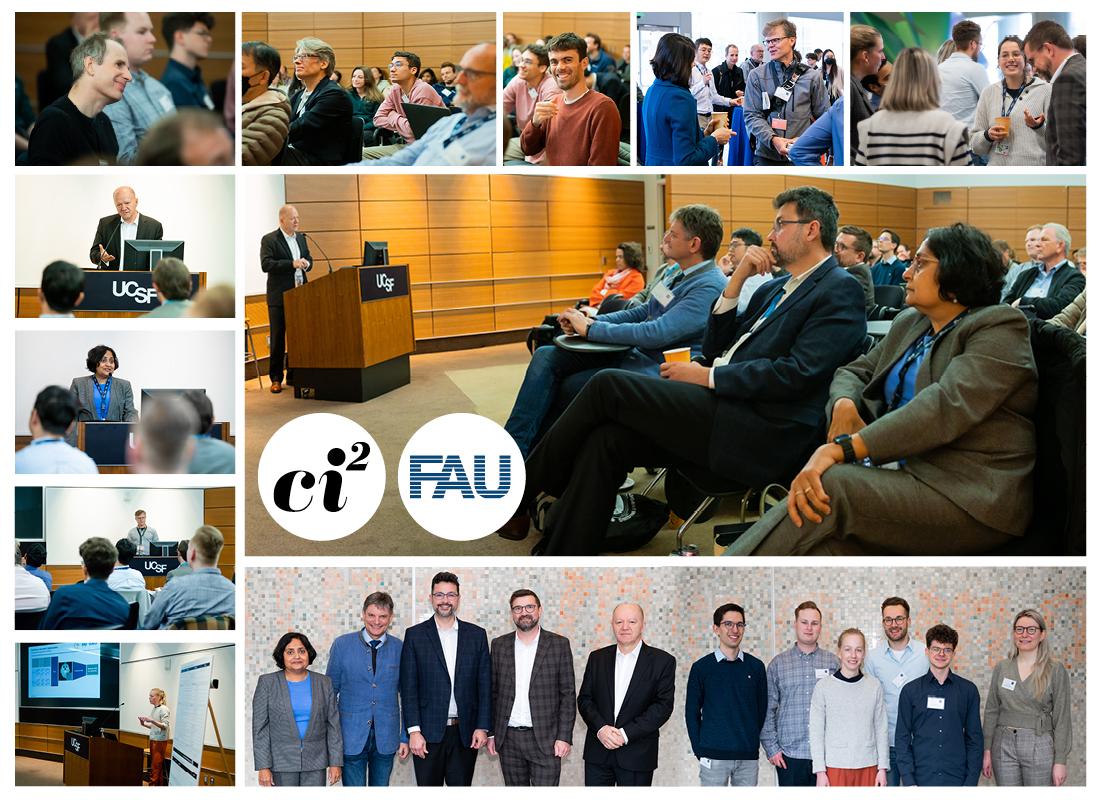UCSF’s Center for Intelligent Imaging hosts Scientific Sessions with Friedrich-Alexander-Universität Erlangen-Nürnberg
 On Wednesday, March 29, the UCSF Department of Radiology and Biomedical Imaging and the Center for Intelligent Imaging (ci2) welcomed a global crowd of researchers to our Mission Bay Campus. The scientific sessions inaugurated a new collaboration with Friedrich-Alexander University (FAU) of Erlangen-Nürnberg, Germany, and helped mark the ci2’s third anniversary celebrations.
On Wednesday, March 29, the UCSF Department of Radiology and Biomedical Imaging and the Center for Intelligent Imaging (ci2) welcomed a global crowd of researchers to our Mission Bay Campus. The scientific sessions inaugurated a new collaboration with Friedrich-Alexander University (FAU) of Erlangen-Nürnberg, Germany, and helped mark the ci2’s third anniversary celebrations.
The experts on imaging and artificial intelligence convened to discuss AI applications in neurological, oncological and musculoskeletal imaging. Christopher Hess, MD, PhD, Chair of Radiology and Biomedical Imaging, and Sharmila Majumdar, PhD, Co-Executive Director of ci2 and Vice Chair for Research in Radiology gave introductory remarks. Joachim Hornegger, PhD, (Dr.-Ing), President of FAU, shared FAU’s past and present history of innovation with attendees.
You can view the program here.
This meeting of research universities was intended to foster an environment of collaboration between FAU and UCSF/ci2. FAU, founded in 1743, has been a European leader in technological development for nearly three centuries. FAU’s partnerships with German and EU industrial and technological innovators match well with UCSF’s linkages to Bay Area biotech innovators.
UCSF and ci2 were represented by presenters Yang Yang, PhD, Aniket Tolpadi, Valentina Pedoia, PhD, Christoph Krist, PhD, Jae Ho Sohn, MD, MS, Beck Olson, Andreas Rauschecker, MD, PhD, Abhejit Rajagopal, PhD, Peder Larson, PhD and Andrew Burghardt.
Dorin Comaniciu, PhD, Senior Vice President for Artificial Intelligence and Digital Innovation at Siemens Healthineers, concluded the scientific sessions with a keynote entitled “Artificial Intelligence for Healthcare, the Road Ahead.” After highlighting the chronically severe shortage of staffing in healthcare, he discussed the AI evolution as a major component of the increased automation and productivity in healthcare that is required to meet increased demand in patient care. He also advanced the argument that "artificial intelligence is not here to replace doctors, it’s here to augment their intelligence and relieve them from repetitive tasks so they can focus on what they do best – patient care."
The UnConference breakout sessions on Thursday, March 30, were an opportunity for attendees to engage more fully with the topics presented in Wednesday’s scientific talks. Questions of possible collaboration, other research avenues, and discussion over results from the first day sprouted an intense series of break-out groups, in a flexible conference environment designed to adapt to these emergent topics. While the international arrivals had been disappointed by their arrival in sunny California being greeted by the quenching rain, old Sol emerged on Thursday to welcome the thriving creativity and connections. After a light breakfast and a bit of socializing, groups comprising of students and faculty from both UCSF and FAU formed organically to continue the discussions that had begun the previous day. After a few hours of discussions, the groups identified 10 potential projects in the areas of advanced imaging and artificial intelligence that also would involve the exchange of students. Over the course of the year, teams comprised of both UCSF and FAU researchers will submit grant proposals that support these efforts.
